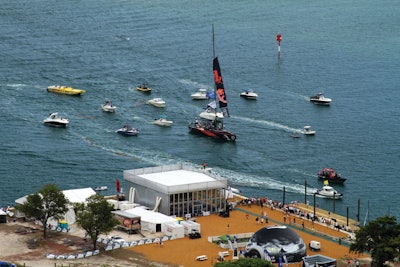
Last month, while attending Volvo’s sustainability conference in Miami, a select group of editors had the chance to visit the race village for the Volvo Ocean Race. For those unfamiliar with the race, it is a grueling nine-month trek around the world in Volvo Open 70 racing boats. Brief stopovers such as the one in Miami allow the crews time to recharge, repair damage to their boats (and in some cases themselves) and accumulate additional points by competing in short in-port races.
The race village gives spectators an opportunity to get to know more about the race, the crews and the sponsors. As a special treat, in addition to presentations and videos highlighting the rigors and hardships the crews face, editors were allowed a rare visit aboard one of the racing boats, sponsored by the city of Abu Dhabi. (View images of the tour at www.Facebook.com/EquipmentToday.)
We were also given a behind-the-scenes tour of the “camps” housing the support teams. These teams are responsible for continuously feeding information back and forth to the race crews and managing logistics during and between the various stages of the race. Once the boats arrive in port, it is the support team’s responsibility to repair and maintain the equipment, re-stock supplies and ensure the boats are fully prepared for the next stage of the race.
Our visit to the race village gave us a much greater appreciation of the challenges the crews face, and how important effective teamwork, and good equipment, is to a successful outcome. One thing that stood out is the emphasis placed on the leadership skills of the captains of these vessels. Their ability to guide their crews across a vast expanse of ocean, communicate objectives and not only put together but maintain a cohesive team for the duration of the race have proven critical in this year’s event, as well as races past. The captain who commands his vessel most effectively is the one who will ultimately lead his team to capture the cup once the race concludes early next month. (Find out more at www.volvooceanrace.com.)
Obviously, there are vast differences between what you do and a sporting event such as this one. Yet, there are some comparisons that can be drawn, as well.
Managers at all levels in a construction firm must oversee their staff for weeks or months at a time, ensuring that each stage of a project stays on time and on track, and that workers continue to work together as efficiently as possible. Effective communication between managers, workers on site and those back in the office is essential to ensure each project stage is successfully completed. And careful coordination is required to manage the complex logistics and requirements of the job and any potential risks along the way.
The ability to guide your team effectively is paramount to achieving your company’s profit goals on each of the projects you take on. So make sure you have the right people with the proper skill sets to maximize your chance to win that all-important prize — whether it’s a higher profit margin or completion bonus — once the job is done.




















